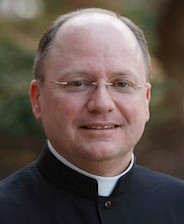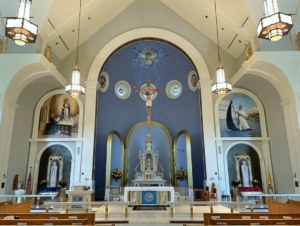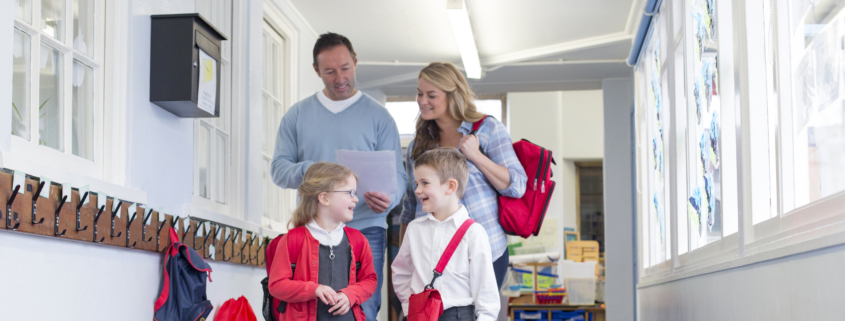A Pastor Saves His Flock by Catholic Education
Editor’s Note: A version of this piece was published at Crisis Magazine.
“We shall have to build the schoolhouse first and the church afterward,” the bishop declared, expressing his alarm about the corruption of young Catholics in secular schools. “In our age, the question of education is the question of the Church.”
These famous words of Archbishop “Dagger John” Hughes, who was New York City’s first Catholic shepherd in the mid-1800s, seem no less relevant today. And in Fairfax County, Va., where critical race theory, gender ideology and emptied classrooms because of COVID have sparked protests by angry parents, a parish priest is taking up Hughes’s mission of helping Catholic children get out of public schools by every means possible.

Father John De Celles (Photo by Paul Haring)
When the pandemic hit last year, Father John De Celles of St. Raymond of Penafort Parish in Springfield, Va., instituted a one-time $2,000 scholarship for each child in his parish who switches from a public elementary or secondary school to a Catholic parochial or lay-run school. Father has renewed that offer again for the 2021-22 school year, thanks to the generosity of parishioners who don’t have school-age children.
In addition, this year he doubled the parish’s annual, renewable scholarships to $1,000 for students in Catholic grade schools and $2,000 for students in Catholic high schools. On a case-by-case basis, St. Raymond’s offers additional financial aid to families in need and helps cover the direct educational costs of families who homeschool.
These scholarships are not a marketing strategy for the parish school—in fact, there is no school at St. Raymond’s. Instead, parishioners attend nearby parochial schools or Angelus Academy, one of a growing number of faithful, lay-established schools. St. Raymond’s also supports an active group of Catholic homeschooling families.
The goal in promoting all of these options is to ensure that kids get a Catholic formation.
“We need to do whatever we can to help parents get their kids out of these corrupt government-run schools,” Fr. De Celles tells The Cardinal Newman Society. “We talk a lot about ‘evangelization,’ but we’re losing the souls we already have if we let these little ones be prey to the wolves. They will leave us and Jesus. We must do everything we can to save them, literally.”
The parish scholarships and Father’s efforts to highlight the dangers of public schools in bulletins and other parish communications have persuaded families to make the switch to Catholic education. One family told him they “cannot imagine going back to the public school system.”
Another family, whose 5th-grade son transferred from a public school into a Catholic school, told Father, “It was the best decision we made. Your assistance helped to make this happen for us, and we remain eternally grateful to you!”
Fr. De Celles was especially happy to grant a full scholarship to a single immigrant mom with huge financial troubles. He awarded another to a family caught up in financial problems related to the pandemic. This year, he said, the family is back on their feet and able to pay most of the tuition themselves.
“Parents tell me all the time how they love the Catholic schools, and how grateful they are,” Father says.
Returning to an old solution
The outlook for Irish Catholic immigrants in the mid-19th century was dismal, but Archbishop Hughes did not abandon his people. Instead he brought them to Christ through rigorous moral preaching and continually proclaiming the love of the Sacred Heart. The Archbishop’s attentiveness helped the Irish people relearn a sense of sin and guilt and become outstanding citizens and leaders in the city.
Importantly, he knew that education was the way to help the Irish people up from poverty and lawlessness to stable and upstanding lives. Hughes fought against the public school system, which was essentially run by Protestants. His attempt to win state support for Catholic schools caused controversy and a backlash with the Maclay Bill of 1842, which barred religious instruction from public schools and funds for denominational schools. But Hughes was not deterred, establishing even more Catholic schools.
Were the challenges he faced much different from what we face today? American Catholics were openly discriminated against for their religious beliefs. Large numbers of Catholic immigrants were quickly assimilated into public schools, which opposed Catholic teaching. Families were in crisis—especially the poorest in the inner cities—and they were battered by promiscuity, alcoholism, disease and absent fathers.
Today America is much more prosperous, yet the challenges facing the Church and society still include discrimination against Catholic beliefs, the assimilation of Catholic immigrants, sexual immorality, substance abuse, fatherlessness and even a devastating plague—plus the corruption of public schools.
All this suggests a return to the solution of Archbishop Hughes: first and foremost, tend to the spiritual and temporal needs of Catholic families. Renew courageous moral preaching, confidence in the love of Christ. And renew commitment to faithful Catholic education in any way that serves the needs of families, forming Catholics to be lights in the darkness.
Pastors like Father De Celles carry on the mission of Archbishop Hughes and others who established Catholic education in America, including St. Elizabeth Ann Seton, St. John Neumann and St. Katherine Drexel. Fr. De Celles recalls the Third Plenary Council of Baltimore in 1889, in which America’s bishops urged parents to withdraw their kids from public schools.
“Today we have an even worse problem,” Father says. “In 1889 the public schools were at least teaching with a Christian foundation, albeit Protestant. Now we face an anti-Christian and really anti-Christ school system.”
On the dangers of public education, bishops today are “essentially silent,” laments Fr. De Celles. “Parents and pastors and bishops should be doing everything possible to save their children from the abuse of public schools.”
Protecting children
Northern Virginia’s Fairfax County, where St. Raymond Parish is located, and nearby Loudoun County have become hotbeds for false ideology. For example, the Loudoun County public schools recently required teachers to use students’ preferred gender pronouns. Students who identify as “gender-expansive and transgender” are allowed to participate in sports “in a manner consistent with the student’s gender identity,” Fox News reported.
In Fairfax County, public school teachers, principals and other leaders held a one-hour Zoom conference with author Ibram Kendi, an advocate of critical race theory. As the Federalist reported, the call cost $20,000, and the district spent $24,000 on Kendi’s books while making them required reading for K-12 students.
Fairfax schools are also required to make bathrooms and locker rooms available to students based on their self-identified gender. Students must be identified by chosen names and genders, even in official school yearbooks.
These are just a handful of the dangerous influences in public schools. The bottom line is that many public schools today are promoting a worldview that’s inconsistent with our faith and often anti-Catholic. Parents, especially Catholic ones, are pulling their kids out.
“We sent our eldest daughter to Kindergarten at a public school, with the hope of using public school for as long as possible, given the expensive tuitions for four children in Catholic school,” recalled one of the families that sought help from St. Raymond Parish. “But we pulled her after her first year, when a teacher casually spoke about same-sex marriage.”
“We have tried to instill our faith in our children as their primary teachers, and now more than ever we know how important it is to protect them from what is being taught in the public schools,” the family wrote.
It’s a concern that Fr. De Celles wants everyone in his parish to take seriously. In a parish bulletin in May, Father wrote that the problems “cause me to wonder if it is immoral to send children to these schools.”

St. Raymond of Penafort Parish in Springfield, Va.
“Think about this: we were all rightly outraged when we heard about the abuse of children by priests and bishops a few years back,” wrote Fr. De Celles. “I remember how, for a while, so many people treated all priests as suspect of these horrible deeds. And we still have all sorts of rules in place in the Church that are to protect our children from the possibility of this ever happening. I understood that.”
“But now I wonder, why do we not feel/think the same outrage and suspicion toward our government bureaucrats and elected officials who are also abusing our children by warping their minds with this filth and nonsense? How can we corrupt our kids with this cow manure, and still say we love them, much less expect them and ourselves to remain in God’s favor? How can we do this to our little ones and not fear the fires of hell—for them and us?”
It couldn’t get more serious than that. For Fr. De Celles, helping young Catholics obtain a faithful Catholic education is a pastor’s solemn duty. He is leading the way through his own actions and the generosity and conviction of his parishioners.
It is an approach that will, we hope, be replicated in parishes and dioceses around the country.

